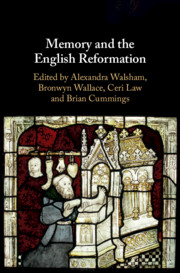Book contents
- Memory and the English Reformation
- Memory and the English Reformation
- Copyright page
- Dedication
- Contents
- Figures
- Contributors
- Preface and Acknowledgements
- Abbreviations
- Introduction
- Part I Events and Temporalities
- 1 Nailing the Reformation
- 2 Remembering the Dissolution of the Monasteries
- 3 Remembering the Past at the End of Time
- 4 Henry VIII’s Ghost in Cromwellian England
- 5 Remembering Mary, Contesting Reform
- 6 Converting the Cross
- Part II Objects and Places
- Part III Lives and Afterlives
- Part IV Rituals and Bodies
- Index
4 - Henry VIII’s Ghost in Cromwellian England
from Part I - Events and Temporalities
Published online by Cambridge University Press: 30 October 2020
- Memory and the English Reformation
- Memory and the English Reformation
- Copyright page
- Dedication
- Contents
- Figures
- Contributors
- Preface and Acknowledgements
- Abbreviations
- Introduction
- Part I Events and Temporalities
- 1 Nailing the Reformation
- 2 Remembering the Dissolution of the Monasteries
- 3 Remembering the Past at the End of Time
- 4 Henry VIII’s Ghost in Cromwellian England
- 5 Remembering Mary, Contesting Reform
- 6 Converting the Cross
- Part II Objects and Places
- Part III Lives and Afterlives
- Part IV Rituals and Bodies
- Index
Summary
This chapter examines a group of closely related pamphlets published in the late 1650s around the time of Oliver Cromwell’s death that stage a dramatic dialogue in the crypt of St George’s Chapel, Windsor, between the ghosts of Henry VIII and the freshly interred Charles I. A Messenger from the dead (to give these anonymous English and Latin texts a collective title) advances the extraordinary claim that the recent civil wars, the regicide and the nation’s descent into political turmoil represent God’s delayed punishment for Henry VIII’s alleged crimes against the Catholic Church several generations earlier. I argue that this unorthodox thesis is not unique to Messenger but enjoyed a wider circulation in seventeenth-century culture. In asking who promoted and stood to benefit from such an explanation of recent events, I explore the significant differences among the various texts of the pamphlets, including their place of publication and ideological motivation.
- Type
- Chapter
- Information
- Memory and the English Reformation , pp. 98 - 116Publisher: Cambridge University PressPrint publication year: 2020
Accessibility information
- 1
- Cited by

